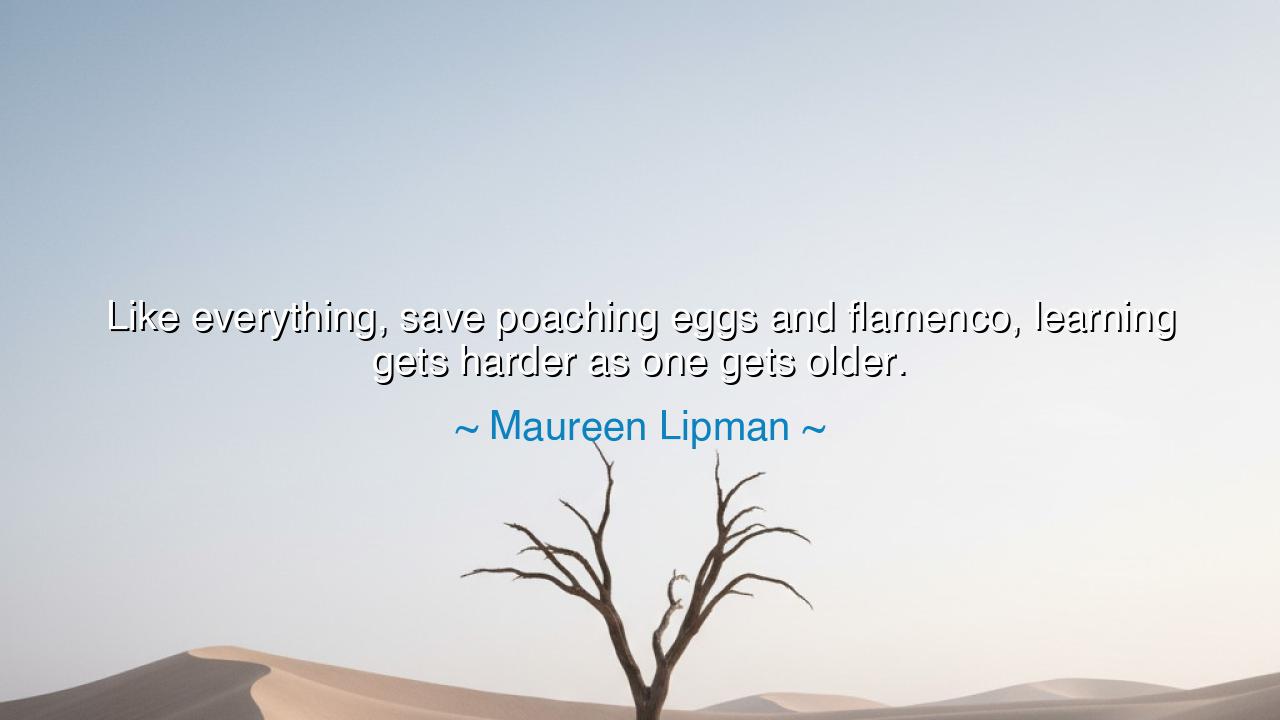
Like everything, save poaching eggs and flamenco, learning gets
Like everything, save poaching eggs and flamenco, learning gets harder as one gets older.






In a voice that smiles while it instructs, Maureen Lipman quips: “Like everything, save poaching eggs and flamenco, learning gets harder as one gets older.” Beneath the wit lies a sober bell. She names the familiar drag of years—the way the mind, once a swift river, becomes a braided stream that must choose its current with care. Yet by leaving two mischievous exceptions—poaching eggs and flamenco—she reminds us that difficulty is not destiny; it is only texture. Some arts become easier because they ask for rhythm and heat rather than encyclopedias; others thicken because they demand humility before novelty.
Why does learning resist us as we age? Not because wisdom departs, but because habits harden. The ancients taught that the first offering at any altar is attention. In youth, attention leaps; in age, it lingers where it has been fed. To learn anew is to unseat comfort and enthrone curiosity—to trade the warm cloak of mastery for the bracing wind of apprenticeship. Lipman’s jest is a gentle goad: honor the drag, but do not enthrone it. Bend your days toward practices that keep the mind supple—cadence, patience, and the courage to be a beginner again.
Her two exceptions are parables. Poaching eggs asks for a few faithful moves—simmer not boil, vortex not chaos, vinegar like a blessing—and then a willingness to accept imperfection made edible. It rewards presence more than theory. Flamenco burns from the sole to the soul: compás in the bones, palmas in the hands, duende in the throat. It is discipline wrapped in heat. Both crafts preach the same sermon: when learning is embodied—timed by breath, counted by steps—it can pierce the crust of age and reach the bright center of play.
Consider a lamp from history. Grandma Moses, hands gnarled by decades of farmwork and embroidery, began to paint in her late seventies. She did not chase museums; she painted what she had lived—barns, snowfields, quilts of autumn. The world came to her because she stayed honest with her materials. Learning was harder, yes—her joints testified—but it was not closed. Her story rebukes the surrender that masquerades as realism: the gate may be narrow, but it still admits pilgrims who arrive late and walk steadily.
Another lamp: Nola Ochs, who earned a college degree at ninety-five. She read in small allotments, wrote in long patience, and brought to the seminar a lifetime of context no freshman could match. Where youth had speed, she had context; where youth had surplus energy, she had aim. This is the secret exchange of age: we lose immediacy but gain integration. The lesson is not that elders must race the young, but that they can apprentice themselves to focus, trimming waste from effort like a careful chef skimming a stock.
So, yes, learning often grows harder with age—but it also grows richer. The mind that has buried friends and mended mistakes can hear tones in a poem, harmonies in a language, meanings in a map that a quick learner may miss. The slope steepens, and the view deepens. The work shifts from acquisition to assimilation; from collecting facts to composing wisdom. Lipman’s joke, rightly received, becomes a compass: laugh at the friction, then face the hill.
Carry these practices like pocket charms. Make a short, daily rite: fifteen minutes to learn something new before the world speaks—scales on a cheap keyboard, verbs in a foreign tongue, a sketch of the hand that holds the pencil. Bind study to body—walk while reciting, clap rhythms, cook recipes in the language you’re studying—so memory has muscle. Seek small wins that stack: one stanza memorized, one paso básico counted clean, one perfect egg. Keep company with beginners of all ages; exchange pride for feedback; let joy, not fear, set the pace. And when discouragement arrives, make Lipman your patron saint: crack two eggs, put on flamenco, and remember that even in late light, the kitchen of the mind still steams with possibility.






AAdministratorAdministrator
Welcome, honored guests. Please leave a comment, we will respond soon